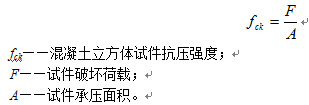问题
问答题 简答题
简述混凝土立方体抗压强度。
答案
参考答案:
混凝土标准立方体的抗压强度,我国《普通混凝土力学性能试验方法标准》(GB/T50081-2002)规定:边长为150mm的标准立方体试件在标准条件(温度20±3℃,相对温度≥90%)下养护28天后,以标准试验方法(中心加载,加载速度为0.3~1.0N/mm2/s),试件上、下表面不涂润滑剂,连续加载直至试件破坏,测得混凝土抗压强度为混凝土标准立方体的抗压强度fck,单位N/mm2。

